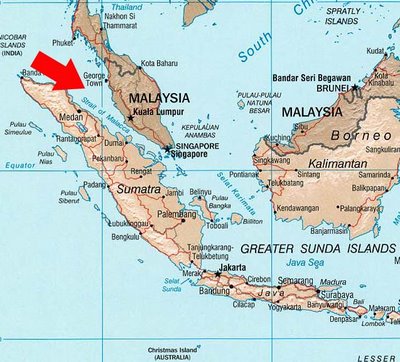
Reported here:
Singapore, Malaysia and Indonesia have signed a formal agreement to coordinate patrols along the Straits of Malacca.In a related story, a regional reporting network has been established as noted here:
The signing is a significant milestone in securing the Malacca Strait, which is one of the busiest sea lanes in the world.
The security of the Malacca Strait is seen as vital for the world economy.
Each day shipping vessels carry more than 10 million barrels of crude oil through the Malacca Strait, and about 50,000 ships cruise that same sea lane each year.
Naval ships from Singapore, Indonesia and Malaysia have been making their presence felt along the busy Malacca Strait since July 2004.
Coordinated patrols were beefed up last year with the use of 'eye-in-the-sky' aerial surveillance along the busy sea lane.
The chiefs of defence force from Singapore, Malaysia and Indonesia met in Batam on Friday to sign and formalise the Malacca Strait Coordinated Patrol network.
The success of the coordinated patrols can be seen in the numbers -- two years ago when the patrols started, there were more than 30 reported cases of piracy along the Straits of Malacca, last year the number fell by more than two thirds.
This year alone there have been only two reported cases.
Under the agreement, there is better management and coordination of sea and air patrols.
Operational units will also have their roles and conduct clearly defined, like the hot pursuit of bandits across territorial waters.
THE region's continued fight against piracy took a big step forward yesterday with the unveiling of a network system that would allow the participating countries of the anti-piracy agreement to share information and monitor developments in the regional waters.
Under the Regional Cooperation Agreement on Combating Piracy and Armed Robbery against Ships in Asia (ReCAAP), which aims to promote cooperation on maritime security among 16 countries, an Information Sharing Centre (ISC) will be set up here. (NB: here=Singapore)
Transport Minister Yeo Cheow Tong yesterday unveiled the Information Network (IFN) system which would form the backbone of the information-sharing arrangements.
Developed by ST Electronics at a cost of close to $1 million, a prototype will be ready by June. The secure web-based system will facilitate 24-hour submissions of incident reports by ReCAAP member countries. Besides disseminating information and news alert to these countries, the system will also manage records through a database management system and generate textual and graphic reports for analysis.

No comments:
Post a Comment